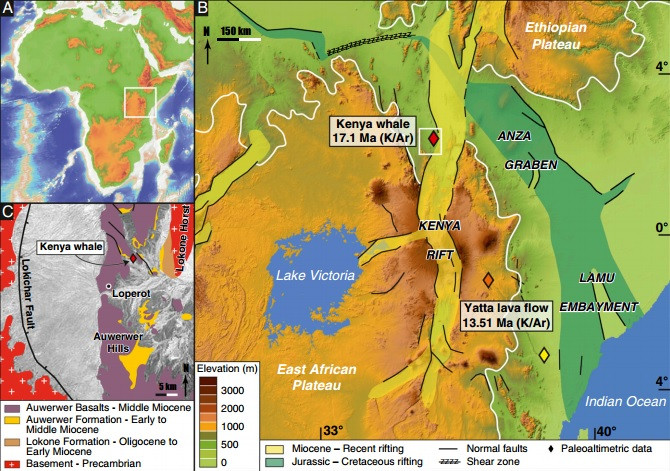17 million-year-old whale fossil that went missing for 30 years sheds light on East Africa uplift

A prehistoric whale fossil that was found 740km inland and 640m above sea level in northern Kenya in 1964 has finally been analysed after going missing in museum archives for more than 30 years.
The beaked whale fossil is the oldest ever discovered, dating back 17 million years. It was described 11 years after first being found, but then went missing in 1975 and did not reappear until 2011 – a frustrating disappearance for scientists wanting to analyse the bones to find out more about the whale and the landscape it was found in.
Speaking to IBTimes UK, Henry Wichura, lead author on the latest study on the whale, said: "It disappeared somewhere in the archives of the Harvard University. It is a very big bone, so they put in storage for big specimens and somehow the number got lost – the code that you give – so they could not identify it."
Louis Jacobs, who is second author on the study, had heard about the missing specimen and had spent decades asking around after it. "He was always unsuccessful," Wichura said.

"But then in 2011 he found out Harvard University had a new collection of big fossils. He asked the curator about the whale and then 15 minutes later she called back and said we have it. Somehow it had got lost in the archives."
Jacobs then analysed the whale and researchers were able to use the information to establish when the uplift began in the East Africa region – a subject that has been of much debate.
The analysis shows the onset of the East African plateau uplift took place after 17 million years – as otherwise the whale would not have been able to get stranded where it did.
"This stranded whale fossil provides the first constraint on the initiation of east African uplift from near sea level at 17 Ma. This, in turn, limits the timing and initial elevation of environmental change indicated by geodynamic and climatic modelling, paleosols, isotopes, paleobotany, and the mammalian fossil record," the authors wrote.
Researchers believe the fossil is that of a deep-diving open ocean whale and this creature likely travelled from the Indian Ocean inland along a river – possibly while migrating along the East African coast. It was then stranded in a humid and densely vegetated environment, where it died.

Scientists struggle to date the onset of uplift in the East Africa plateau because evidence was destroyed by the rift valley – a geological feature that took place later than the uplift.
"It was found on the north-east periphery of the East Africa plateau. Since whales don't fly it's very hard to get on 640m of elevation. There should be other processes that bring it up and that is mostly controlled by the plateau uplift.
"It's very satisfying. It is really interesting what you can do with just one data point... What researchers were not sure about was when the onset of uplift was. With this whale we could fix that and that's very cool."
© Copyright IBTimes 2025. All rights reserved.






















